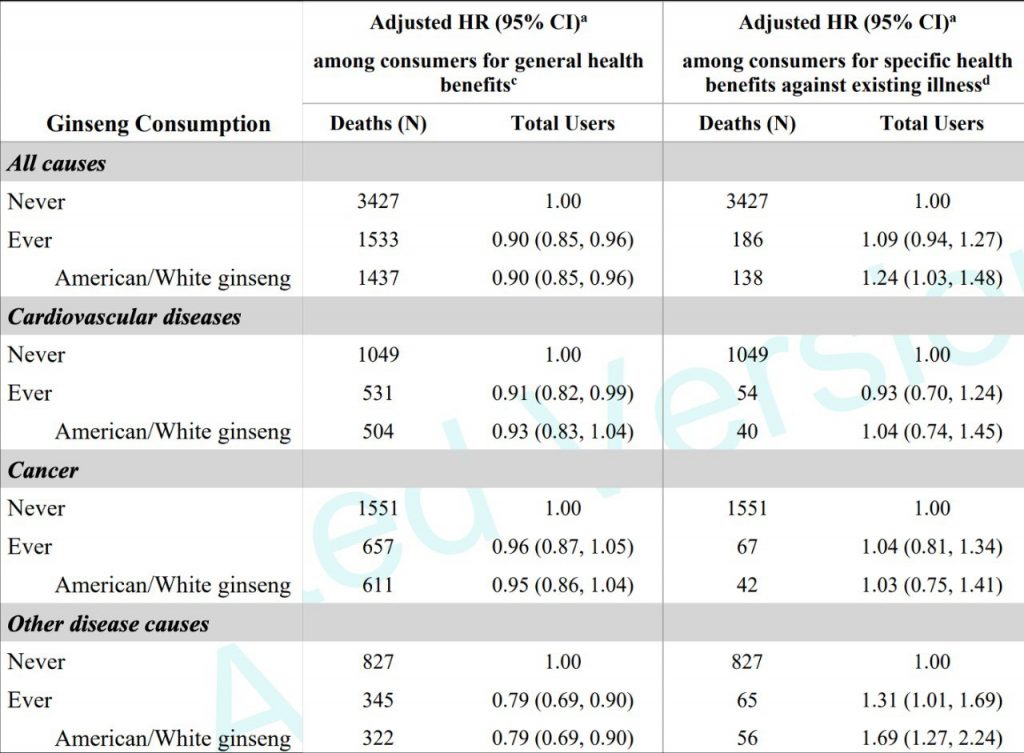When consumed for a prolonged period – more than three years – ginseng is associated with decreased all-cause mortality, death due to cardiovascular disease, and death due to other diseases.
Ginseng has long been touted as a health food supplement, traditionally accepted as a panacea for illness and disease. However, claims of its ability to improve overall health, strengthen the immune system, and cure conditions from diabetes to erectile dysfunction have not been well-studied. Still, new evidence alludes to the truth of these claims.
In a recent study, borne out of a collaboration between Vanderbilt University in Nashville and the Shanghai Cancer Institute, published in the Journal of Epidemiology, Pradhan and colleagues found an association between ginseng consumption and mortality (or rate of death) in Chinese women aged 40 to 70. Looking at over 56,000 women for about 15 years revealed that regular ginseng use — for perceived health benefits — was associated with reduced all-cause mortality rates and reduced risk of death due to cardiovascular disease and other diseases. These benefits increased with longer durations of ginseng use. However, mortality risk did not decrease if ginseng was taken to treat existing illnesses.
“Our results suggested that regular ginseng consumption may confer some health benefits in reducing mortality,” the authors wrote.
Ginseng Decreases Mortality Among Chinese Women
Of the study’s participants, 25.4% were regular ginseng users — consumed ginseng at least five times a year within the last three years — and were on average older, more educated, had higher income, and exercised more regularly compared to the other participants. However, regular ginseng users also had higher frequencies of hypertension and diabetes.
After adjusting for other variables, Pradhan and colleagues found that ginseng use was associated with decreased risk of all-causes of death among participants. This association was evident for those who used ginseng to improve their overall general health but not as apparent for those who used ginseng for specific diseases.

The duration of ginseng use seems more critical than the amount of ginseng consumed. In terms of use duration, increases in duration were associated with a lower risk of all-cause death, death due to cardiovascular disease, and death due to other causes. In terms of amount, a low amount of American or white ginseng (less than 375 grams per year) was enough to decrease mortality risk. In comparison, higher amounts (over 375 grams per year) of ginseng consumption were not associated with further benefits.
Ginseng: The Good and The Bad
Despite its 2000 years of use in Asian countries, the benefits of ginseng are scarcely documented in the scientific literature. One of ginseng’s components – ginsenosides – has been shown to have anti-inflammatory and anti-diabetic properties in animal models. Other animal studies show that ginseng helps extend lifespan, prevents weight gain, and has neuroprotective effects. Ginseng also improves the function of blood vessels, improves lipid profiles, and decreases atherosclerosis risk by reducing cholesterol levels, free fatty acids, and triglycerides in animal models.
This study, which retrospectively looked at women who have taken ginseng regularly, showed that it has positive effects on mortality, particularly mortality risk due to cardiovascular disease, at least among women in China. Another smaller study in a Korean cohort showed that ginseng use among males leads to decreased all-cause mortality, and female users showed decreased risk of death due to cancer, which was not seen in this more extensive study.
While ginseng is associated with prolonged lifespan and lower disease prevalence, there are also potential downsides to taking ginseng, including various side effects and medication interactions. It has been reported to cause nervousness and insomnia, and long-term use has been linked to headaches, dizziness, and gastrointestinal issues. Women may also experience menstrual changes with long-term use. Furthermore, the world of herbal supplements is not well regulated, and there may be concerns about toxicity from contaminated sources.
Overall, ginseng does seem to have the science to back its benefits, but more research is needed, particularly in other countries, to see if it has similar effects even when diets change. However, retrospective studies such as this may prove challenging in Western countries, such as the U.S., where ginseng use may not be as common. Also, ginseng does not seem to treat existing illnesses. While the underlying causes of ginseng’s therapeutic effects still need to be worked out, it could be that its anti-inflammatory properties help to prevent age-related complications.